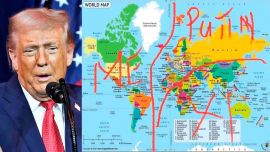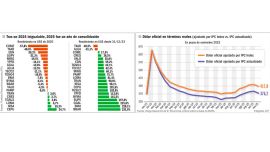The International Monetary Fund announced on Thursday that its executive board had approved the latest review of Argentina's multi-billion-dollar credit-line and approved a disbursement of US$6 billion in fresh funds, allowing the government to receive more money as the economy shows signs of slowing.
This new disbursement, validated by the Fund's board of directors, means the troubled country has now received US$23.5 billion since it signed a new debt assistance programme last March.
In total, the 30-month programme is expected to reach a total of US$44 billion (or 31.91 billion Special Drawing Rights or SDRs, the IMF's foreign exchange reserve-based unit of account) for Argentina, by far the largest aid programme ever granted by the international lender.
The IMF also said it was satisfied with the economic policies implemented by the government since last July, highlighting falling inflation, an improvement in the trade balance and also in foreign exchange reserves.
"However, macroeconomic imbalances persist, and conditions remain fragile," said Gita Gopinath, deputy managing director of the Fund, quoted in a IMF communiqué.
In particular, the Argentine government must maintain its policy of reducing the public deficit in order to "support the disinflation and reserve accumulation processes, alleviate financing pressures, and strengthen debt sustainability," Gopinath added.
IMF officials also approved two waivers for Argentina regarding foreign exchange restrictions and multiple rates, and called for their removal as soon as possible. In November, Argentina reinstated a temporary exchange rate only for soybean exports that runs through the end of the year, which IMF staff said "is not a substitute for sound macroeconomic policies."
Argentina's agreement with the IMF foresees a series of measures aimed at controlling the country's chronic inflation, which has reached 85.3 per cent sof far in 2022, despite a marked slowdown in November.
This is the 13th agreement concluded between the IMF and Argentina since the country's return to democracy in 1983.
The third largest economy in Latin America, Argentina has been experiencing chronic double-digit annual inflation for two decades. Economists expect growth to slow to less than one percent next year, according to the Central Bank's latest survey of market expectations.
The situation remains precarious for the 36.5 percent of Argentines who are in poverty, according to data from the first half of the year, of whom 8.8 percent are in extreme poverty.
Argentina has also had a recent period of instability at the head of its economy portfolio, with no fewer than three heads of the ministry in less than six months.
The architect of the IMF agreement, Martín Guzmán, resigned in a surprise move at the beginning of July, and was replaced by Silvina Batakis, who resigned a month later, leaving Sergio Massa at the head of a 'super-ministry' that brings together three economic and productive portfolios.
– TIMES/AFP
























Comments